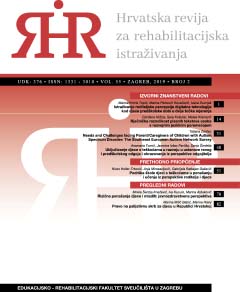UKLJUČIVANJE DJECE S TEŠKOĆAMA U RAZVOJU U USTANOVE RANOG I PREDŠKOLSKOG ODGOJA I OBRAZOVANJA IZ PERSPEKTIVE ODGOJITELJA
INCLUSION OF CHILDREN WITH DISABILITIES IN
PRESCHOOL INSTITUTIONS FROM THE PERSPECTIVE OF
KINDERGARTENTEACHERS
Author(s): Anamaria Tomić, Jasmina Ivšac Pavliša, Sanja ŠimlešaSubject(s): Inclusive Education / Inclusion
Published by: Sveučilište u Zagrebu, Edukacijsko-rehabilitacijski fakultet
Keywords: attitudes; inclusion of children with disabilities; preschool/kindergarten teachers;
Summary/Abstract: For children with developmental disabilities, inclusion in mainstream kindergartens is considered the most appropriate type of education. To achieve this goal, certain preconditions of education quality must be fulfilled, such as procesa and structural aspects of early education quality. Staff attitudes on inclusion of children with disabilities, and inclusion in general, are one of the procesa preconditions. Knowing the main sources of negative attitudes towards children with disabilities, which are one of the biggest challenges in the inclusion procesa, enables understanding of the nature of attitudes, provides guidance for measuring those attitudes more accurately and improves the inclusion process. The aim of this research was to examine the attitudes of kindergarten teachers on the inclusion procesa in mainstream kindergartens in the Republic of Croatia, and to analyse how those attitudes depended on teacher age, education level, work experience ( and years of work in the profession), size of the place of employment, and experience working with children with developmental disabilities. The research participants were kindergarten teachers (N=333) in 14 kindergartens offering a full-time programme in the Republic of Croatia. Data were collected with the Opinions Relative to Integration of Students with Disabilities (ORI) questionnaire, which had been translated to Croatian and adapted for this population. Most participants had neutral or mildly negative attitudes toward inclusion. More positive attitudes toward inclusion were associated with older age, lower education level, and smaller work environment. These results can be a starting point f or further analysis of inclusive issues and the development of lifelong learning programmes for kindergarten teachers in preschool settings.
Journal: Hrvatska revija za rehabilitacijska istrazivanja
- Issue Year: 55/2019
- Issue No: 2
- Page Range: 40-52
- Page Count: 13
- Language: Croatian

